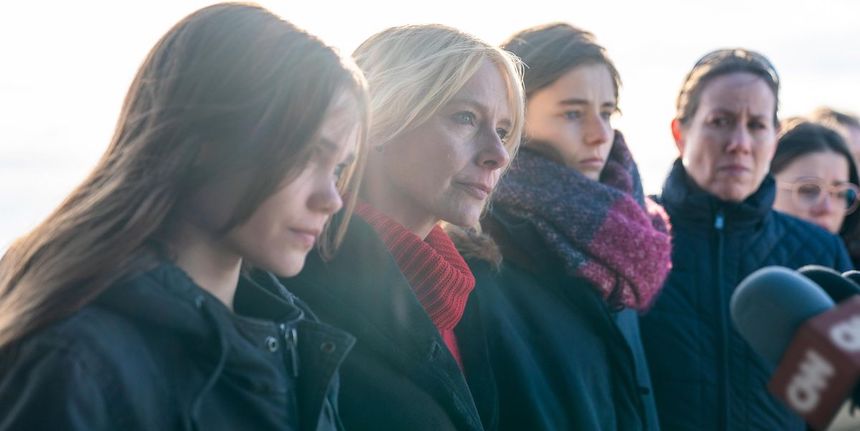Now Streaming: LOST GIRLS Sheds Dramatic Light on a Little Known, True-Crime Mystery
Amy Ryan, Thomasin McKenzie, and Gabriel Byrne star in director Liz Garbus' dramatic mystery, now streaming on Netflix.

Documentary filmmaker Liz Garbus’s (Girlhood, What Happened, Miss Simone?, Searching for Bobby Fischer, The Farm: Angola, USA) feature-length, narrative debut, Lost Girls, a true-crime docudrama based on Robert Kolker’s 2013 book of the same name, opens like a throwback horror film, with an unnamed, twenty-something woman fleeing for her life along a lonely, abandoned road.
Caught by the headlights of an otherwise unseen car, the woman panics and flees into the tall, tangled brush lining the road, never to be seen or heard from again. The mystery of the young woman’s disappearance haunts her single, middle-aged, working-class mother, Mari Gilbert (Amy Ryan), for the duration of Lost Girls intentionally bleak, downbeat, if ultimately realistic, exploration of marginalized women and the socio-economic system of white male privilege and entitlement that turns the idea of “justice” into a literal farce. The subtitle alone, “An Unsolved American Mystery,” signals that the easy, comfortable, comforting catharsis we expect from mystery-thrillers won’t be found here.
When we first meet Mari, she’s haranguing a construction site supervisor for cutting her hours (choosing a younger, more physically attractive woman in her place), hours she needs to make ends meet as a single mother to two teen daughters, Sherre (Thomasin McKenzie, Jojo Rabbit, Leave No Trace) and Sarra (Oona Laurence), still at home, and the third, Shannan (Sarah Wisser), a sex worker, who soon goes missing. Once estranged, but now semi-reconciled with her mother, Shannan fails to show up for dinner at Mari’s home one night.
Sherre initially dismisses Mari’s angst-ridden reaction as overprotective, motherly behavior, but it soon becomes clear that Shannan has, in fact, disappeared. Mari’s initial encounters with the Jersey City police lead exactly nowhere, a symptom of the casual misogyny and sexism of an all-male police force that places minimal value, if any, on the literally and figuratively disposable bodies of sex workers.
Flipping expectations typical of procedurals, Lost Girls focuses on Mari’s obsessive quest to discover the fate of her missing daughter, with our without the help of the local police. Mari soon discovers that her daughter disappeared on an outcall to Oak Beach, an ultra-wealthy, gated enclave on the southern shore of Long Island. Only the outgoing police commissioner, Richard Dormer (Gabriel Byrne), shows the barest semblance of interest or concern in Shannan's fate, but his near-retirement status (an impatient replacement waits offscreen) and the local police department’s function to “protect and serve” Oak Beach's privileged residents.
As an interloper -- and a poor, working-class woman at that -- Mari meets with equal amounts of indifference and hostility from everyone she encounters at Oak Beach, leading Mari, ignored, disregarded, and often treated with contempt, to continue the investigation on her own, ultimately leveraging the sensationalizing local media to raise awareness of her daughter’s disappearance along with the disappearance of young women, all sex-workers, in the area over the previous decade.
It takes the discovery of several bodies, likely moved by the killer, on the same road where Shannan disappeared, for the police and media -- the gruesome discovery brings them out in droves -- to begin to take Mari’s obsessive quest seriously. Taking their cues from Kolker’s book, Garbus and her screenwriting partner, Michael Werwie, shift the focus from the investigation proper -- with the exception of one, potential suspect, Peter Hackett (Reed Birney), a retired physician with obvious sociopathic tendencies -- to the emotional, mental, and physical wear and tear Mari’s obsession takes on her and her fraying, fracturing relationship with her two surviving daughters.
Along with Ryan's standout performance as the brittle, emotionally scarred Mari, Garbus skillfully excavates Mari’s complexities and contradictions with raw, honest authenticity. Mari isn’t always likable (sometimes far from it), but in her fierceness and indomitable desire to uncover her missing daughter’s fate, she’s always relatable, especially in her driving desire for closure.
In its frustrating, unresolved, ultimately ambiguous ending, Lost Girls resembles another true-crime procedural/obsessive, life-altering quest, David Fincher’s classic serial killer drama, Zodiac. Lost Girls inexorably moves towards an essential moment of closure for Mari and her daughters, but it eschews any kind of catharsis.
The killer isn’t captured. The killer isn’t tried in a court of law, found guilty, and sentenced to death or life in prison without the possibility of parole. The social order isn’t restored and with that restoration, our collective faith in a criminal justice system that operates impartially regardless of wealth or privilege, gender or race, isn’t either. It's a grim, sobering conclusion, especially given the current, unsettled state of American politics and the unlikelihood of any significant change in the foreseeable future.
The film premiered at the Sundance Film Festival earlier this year and is now streaming on Netflix.







